Table of content
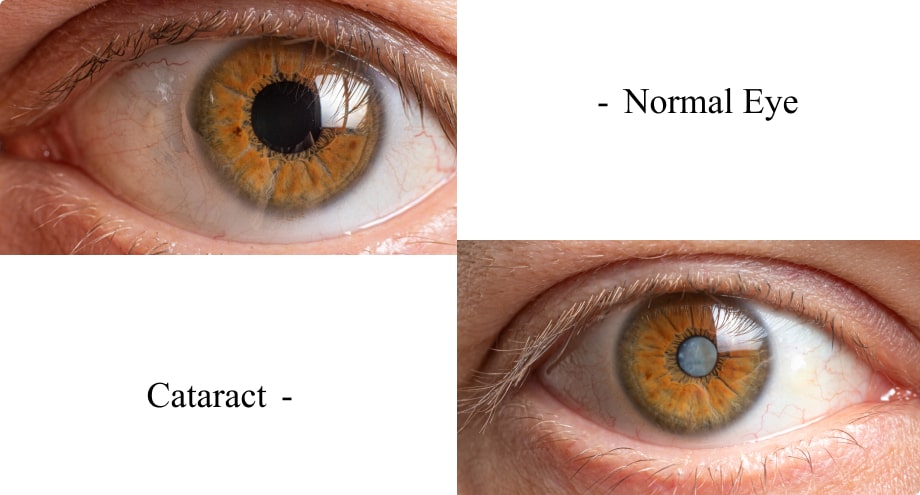
What is Cataract?
Cataracts occur when the lens inside the eye becomes cloudy, like a window that’s fogged up. This cloudiness makes it harder to see clearly and can cause blurry vision or difficulty seeing in bright light. Cataracts are common as people get older, but they can be treated with simple cataract removal surgery.
Symptoms
Usually progressing slowly at first, cataracts don’t initially cause any symptoms. The following symptoms appear as the illness worsens for a person:
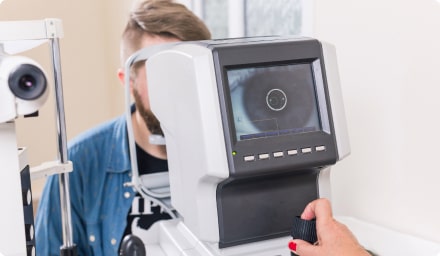
- Blurred or distorted vision
- Sensitivity to light and glare
- Double vision
- Seeing halos around lights
- Changes in colour perception
- Difficulty seeing at night
- Need for frequent changes in eyeglass prescriptions
Causes
Cataracts are mainly caused by old age and being exposed to sunlight. As individuals age, the breakdown and clumping of these proteins in the lens occur, leading to the cloudiness associated with cataracts. Exposure to ultraviolet light is also a risk factor for cataracts.
Types
There are different types of cataracts, which are:
Cortical Cataract
This type of cataract affects the outer layer of the eye’s lens, leading to cloudy areas or white streaks that can make it hard to see clearly, especially in bright light.
Intumescent Cataract
This cataract involves swelling of the lens due to water buildup, which can increase pressure inside the eye and cause vision problems.
Nuclear Cataract
This is a common type that affects the centre of the lens, causing it to harden and turn yellow over time, impacting distance vision more than close-up vision.
Posterior Subcapsular Cataract
This cataract forms at the back of the lens, just under its outer covering, causing glare, sensitivity to light, and difficulty seeing in bright light.
Rosette Cataract
This is a rare type of cataract that creates a star-shaped opacity in the lens, affecting vision depending on its size and location.
Traumatic Cataract
This cataract develops after an eye injury, leading to cloudiness in the lens and potential vision problems that may require surgery to correct.
The approach to cataract removal surgery is personalised based on the type and severity of the cataract, the patient’s overall eye health, and any underlying medical conditions.
Risk Factors
Several factors can increase the risk of developing cataracts, including:
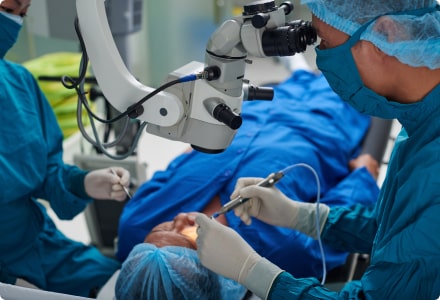
- Ageing (over 60)
- Diabetes (formed at an earlier age in this case)
- Family history of cataracts
- Years of excessive exposure to the sun and UV rays
- Smoking
- Obesity
- High blood pressure
- Past eye injury or inflammation
- Previous eye surgery
- Steroid medication use
How to prevent
These are the steps you can take to prevent cataracts or you can contact us the best eye hospital of Maharashtra
Get regular eye check-ups.
Stay healthy with exercise and a balanced diet.
Wear sunglasses to protect your eyes from UV rays.
Manage conditions like diabetes and high blood pressure.
Types of Treatments
The treatment aims to restore clarity of vision by removing the cloudy lens and replacing it with an artificial one. Common cataract removal surgery options include the following:
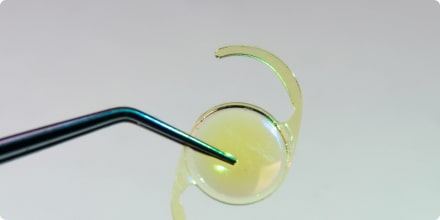
Phacoemulsification Surgery involves utilising ultrasound to remove cataracts and implant an artificial lens, restoring clear vision.
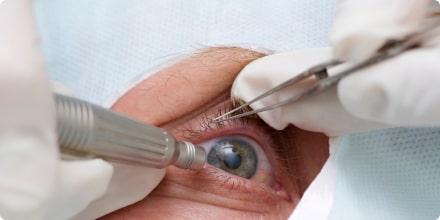
Manual Small Incision Cataract Surgery (MSICS) requires the manual removal of cataracts through a small incision, providing a resource-efficient option.
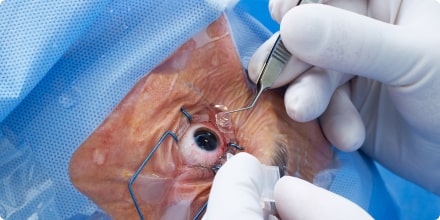
Intraocular Lens (IOL) Implantation is a surgical procedure that implants an artificial lens, reducing reliance on glasses.
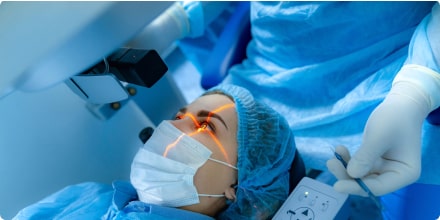
YAG Laser Capsulotomy is performed after surgery, providing a quick laser treatment to clear lens capsule cloudiness for improved vision.
Regular follow-up appointments are essential for monitoring progress, adjusting treatment, and ensuring optimal eye health.
Table of content
Book an appointment
Informative and Comprehensive
Frequently Asked Questions
Common queries about the treatment are addressed in this section. Find your answers here.
What is cataract surgery?
Cataract surgery is a procedure to remove the cloudy lens of the eye (cataract) and replace it with an artificial lens implant to restore clear vision.
How do I know if I need cataract surgery?
You may need cataract surgery if you experience symptoms such as blurred or cloudy vision, sensitivity to light, difficulty seeing at night, or a noticeable decrease in vision that interferes with your daily activities.
What are cataracts, and what causes them?
Cataracts are the clouding of the natural lens of the eye, which is typically clear. This clouding is often due to aging, but can also be caused by factors such as genetics, certain medications, eye injuries, or medical conditions like diabetes.
How long does cataract surgery take?
Cataract surgery is usually a quick outpatient procedure that typically takes about 15 to 30 minutes per eye. However, you may need to spend additional time at the surgical center for pre-operative preparation and post-operative monitoring.
Is cataract surgery painful?
Cataract surgery is typically performed under local anesthesia, so you should not feel any pain during the procedure. Some patients may experience mild discomfort or pressure, but it is usually well-tolerated.
What type of anesthesia is used for cataract surgery?
Most cataract surgeries are performed using topical anesthesia (eye drops) to numb the eye. In some cases, a mild sedative may also be given to help you relax during the procedure.
What are the different types of cataract surgery?
The two main types of cataract surgery are traditional phacoemulsification and laser-assisted cataract surgery (LACS). Both techniques involve removing the cloudy lens and replacing it with an artificial lens implant, but LACS uses laser technology for certain steps of the procedure.
What is the recovery time after cataract surgery?
Most patients experience improved vision within a few days after cataract surgery, with full recovery typically within four to six weeks. During the recovery period, it is important to follow your surgeon's instructions regarding eye care and activity restrictions.
Will I need glasses after cataract surgery?
The need for glasses after cataract surgery depends on several factors, including the type of intraocular lens (IOL) implanted and your individual visual requirements. Some patients may still need glasses for certain activities such as reading or driving, while others may achieve clear vision without glasses.
What are the risks and complications of cataract surgery?
While cataract surgery is considered safe and highly successful, like any surgical procedure, there are potential risks and complications, including infection, bleeding, swelling, retinal detachment, and changes in eye pressure. Your surgeon will discuss these risks with you before the procedure.
How soon can I resume normal activities after cataract surgery?
Most patients can resume normal activities, including driving and light exercise, within a few days after cataract surgery. However, it is important to avoid strenuous activities, heavy lifting, and swimming for at least a couple of weeks to allow for proper healing.
Can I undergo cataract surgery if I have other eye conditions?
The presence of other eye conditions, such as glaucoma or macular degeneration, may affect your suitability for cataract surgery. Your surgeon will evaluate your individual case and discuss the potential risks and benefits of surgery with you.
Can both eyes be operated on at the same time?
While it is technically possible to have cataract surgery on both eyes simultaneously, most surgeons prefer to operate on one eye at a time to reduce the risk of complications and ensure optimal visual outcomes. Your surgeon will discuss the best approach for your individual situation.
What should I expect during the cataract surgery procedure?
During cataract surgery, you will be awake but your eye will be numbed with anesthesia. Your surgeon will make a small incision in the eye, remove the cloudy lens using ultrasound technology (phacoemulsification), and implant a clear artificial lens. The procedure is painless and typically takes less than half an hour.
Will I need to stay overnight in the hospital after cataract surgery?
Cataract surgery is typically performed on an outpatient basis, so you should be able to return home the same day after a short recovery period. However, you will need someone to drive you home after the procedure.
How long do cataract lenses last?
Intraocular lenses (IOLs) implanted during cataract surgery are designed to be permanent and usually do not need to be replaced. However, in rare cases, complications such as lens dislocation or clouding of the lens capsule may require additional treatment or lens exchange.
What should I do if I experience pain or discomfort after cataract surgery?
It is normal to experience some mild discomfort or irritation after cataract surgery, but severe pain or sudden changes in vision could indicate a complication and require immediate medical attention. If you have any concerns, contact your surgeon or seek emergency care.
Can I drive myself home after cataract surgery?
It is not recommended to drive yourself home after cataract surgery, as your vision may be temporarily blurry and you may experience light sensitivity immediately following the procedure. Arrange for a friend or family member to drive you home after surgery.
Will I still need to use eye drops after cataract surgery?
Your surgeon will prescribe eye drops to help prevent infection and reduce inflammation after cataract surgery. It is important to use these medications as directed to promote healing and minimize the risk of complications.
Can cataracts come back after surgery?
No, once a cataract is removed and replaced with an artificial lens, it cannot come back. However, some patients may experience clouding of the lens capsule, called posterior capsule opacification, which can cause similar symptoms to cataracts but can be easily treated with a laser procedure called YAG capsulotomy.
Is cataract surgery covered by insurance?
In most cases, cataract surgery is covered by Medicare and private insurance plans. However, coverage may vary depending on your specific insurance policy and any deductibles or co-payments that apply. It is advisable to check with your insurance provider for details regarding coverage and out-of-pocket expenses.
Can I undergo cataract surgery if I have diabetes?
Yes, individuals with diabetes can undergo cataract surgery. However, it is important to have your diabetes well-controlled before surgery to minimize the risk of complications and promote optimal healing. Your surgeon may also coordinate with your primary care physician or endocrinologist to ensure safe management of your diabetes during the perioperative period.